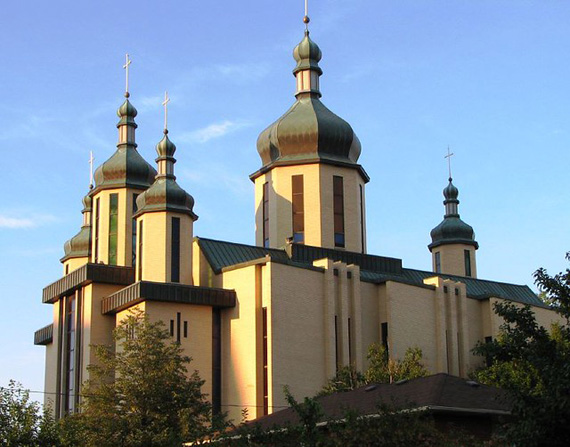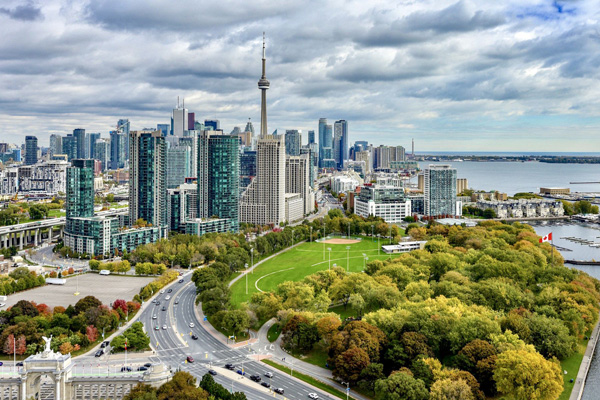Toronto
Toronto. See Map. The capital (2016 pop 2,731,571, with the Greater Toronto Area pop 6,417,516) of Ontario, and the largest industrial, trade, and financial center in Canada. With 104,490 residents of Ukrainian origin in 2001, it has one of the largest Ukrainian communities in Canada, and one of the most important Ukrainian communities outside Ukraine. In 1989, 24,605 inhabitants claimed Ukrainian as their mother tongue.
Ukrainian immigrants began to settle in Toronto early in the 20th century. The social structure of the Ukrainian community has changed considerably over the years. The first immigrants were mostly unskilled, low-paid laborers, single men and women from Western Ukraine attracted by jobs on the railways, in factories and construction, and in domestic service. During the First World War a stratum of skilled workers, tradesmen, and small businessmen emerged. After the Second World War a significant number of Ukrainian war veterans, many of them with a professional education, settled in Toronto. By 1971 the social profile of the Ukrainian community almost matched that of the general community. About 30 percent were employed in the manufacturing industries, 25 percent in the service industries, 14 percent in trade, 7 percent in transportation, 6 percent in administration, and 4 percent in construction. The professional group grew rapidly after the Second World War: by 1978 there were over 200 lawyers, 100 physicians, 50 dentists, 200 engineers, and a few hundred teachers and librarians of Ukrainian origin. Relatively few Ukrainians are found among university professors, top financiers, and civil servants. The first political candidate from the Toronto Ukrainian community to be elected to the Ontario provincial parliament was John Yaremko who held his seat in Toronto’s Bellwoods riding from 1951 to 1975.
Ukrainians have developed strong economic institutions in Toronto. They have organized 16 credit unions, the oldest and largest of which is the Ukrainian Credit Union (est 1944), and the Community Trust Co. They own large development firms (such as Prombank Investments) and trade companies (such as the UBA Trading Company), real estate and insurance companies, dozens of hotels, and hundreds of stores. The Ukrainian Professional and Business Club of Toronto (est 1935) has over 500 members and plays a leading role in Ukrainian economic and cultural affairs.
The first Ukrainian institutions to be established in the city were churches and schools. A Greek Catholic parish was founded in 1906 in the west end, and Saint Josaphat’s Church was built in 1913–14. In the interwar period two more parishes were formed. Today there are eight parishes in the city. In 1948 the eparchy of Toronto, covering Eastern Canada, was set up. Its weekly paper, Nasha meta, is published in Toronto. The Basilian monastic order runs a parish in the city and in nearby Mississauga and publishes the monthlies Svitlo and Beacon at its own publishing house. Another parish is run by the Redemptorist Fathers.
The first Ukrainian Orthodox church parish was organized in 1931, and in 1948 Saint Volodymyr’s Cathedral was consecrated. Two more parishes were founded, one in 1940 and another in 1950. Since 1953 Toronto has been the seat of the Orthodox eparchy of Eastern Canada. Saint Vladimir Institute, organized by the Orthodox community, maintains a student residence, library, and museum. The main Orthodox lay associations are the Ukrainian Self-Reliance League, the Ukrainian Women's Association of Canada, and the Canadian Ukrainian Youth Association. There are five Ukrainian Protestant churches and three Protestant periodicals (Ievanhel’s’kyi ranok, Ievanhel’s’ka pravda, and Ievanhelyst) in Toronto.
The first secular associations in the city were the Ukrainian Mutual Benefit Association of Saint Nicholas (est 1905), renamed the Ruthenian National Benefit Society (est 1910), and the Shevchenko Prosvita Reading Room (est 1914), which in 1928 was reorganized into the Ukrainian People's Home. In 1924 supporters of the hetmanite movement founded the United Hetman Organization. Former soldiers of the Ukrainian armies (1918–20) formed the Ukrainian War Veterans’ Association of Canada in 1928, which became the nucleus for the Ukrainian National Federation, the Ukrainian Women's Organization of Canada, and the Ukrainian National Youth Federation of Canada. The postwar immigration reinforced the existing Ukrainian organizations or set up new organizations, such as the Canadian League for Ukraine's Liberation, the Plast Ukrainian Youth Association, the Ukrainian Democratic Youth Association, the Ukraina and Trident sports associations, a number of veterans’ associations, and several professional associations (engineers, teachers, lawyers). The head offices of practically all recently formed national organizations are in Toronto. The office of the World Congress of Free Ukrainians is also found there. A strong branch of the pro-Communist Ukrainian Labour-Farmer Temple Association was active in Toronto between the wars. Reconstituted as the Association of United Ukrainian Canadians, the group moved its head office from Winnipeg to Toronto after the Second World War.
The larger civic organizations run elementary and secondary Ukrainian classes on Saturdays, and four Catholic schools have a heritage language program in Ukrainian. The independent Hryhorii Skovoroda courses on the secondary-school level, directed by Oleksandra Kopach (1951–78), made a major contribution to education. The Tsiopa Paliiv co-operative Saturday school (est 1972) offers a 12-year program, and an accredited language course is available at Humberside Collegiate. The University of Toronto and York University provide courses in Ukrainian language, literature, and history of Ukraine. The Chair of Ukrainian Studies at the University of Toronto (est 1980) is devoted to history. The Toronto Office of the Canadian Institute of Ukrainian Studies, housing the CIUS Press, the Internet Encyclopedia of Ukraine project, the Holodomor Research and Education Consortium, and other units, has been located at the University of Toronto since 1976. A Ukrainian Canadian Research and Documentation Centre was established in 1982. Besides the university libraries, the richest collections of Ukrainian books and journals are found at the library of the former Ukrainian People's Home, the Ukrainian National Federation, the Ukrainian Youth Association, and Saint Vladimir Institute.
Toronto is the most important Ukrainian publishing center in Canada. The Ukrainian press published in Toronto has included the weekly papers Nasha meta, Homin Ukraïny, Novyi shliakh, Zhyttia i slovo, and Ukraïna i svit; the biweekly Bat’kivshchyna; the monthly magazines Novi dni, The Ukrainian Canadian, Svitlo, and Zhinochyi svit; the bimonthly Visti kombatanta; and the quarterly Plastovyi shliakh. There are two daily radio programs and two weekly Ukrainian TV shows.
A number of musical institutions are or were active in Toronto: the Lysenko Music Institute, the Canadian Ukrainian Opera Association (est 1978), and the Ukraine Millennium Foundation (est 1983). Besides numerous church choirs, there are several concert choirs: the male Prometheus and Burlaka choirs, the female Dibrova and Vesnivka choirs, the chamber choir of Musicus Bortnianskii, and the Lysenko Chorus. Of the various drama groups that were active after the war the Toronto Zahrava Theater continues to perform and the Avant-Garde Ukrainian Theater has staged experimental plays between 1984 and 1989. A number of well-known Ukrainian artists work in Toronto. The Focus Gallery, Saint Vladimir Institute, and the Ukrainian Canadian Art Foundation exhibit the works of Ukrainian artists from around the world.
Andrij Makuch
[This article was updated in 2005.]

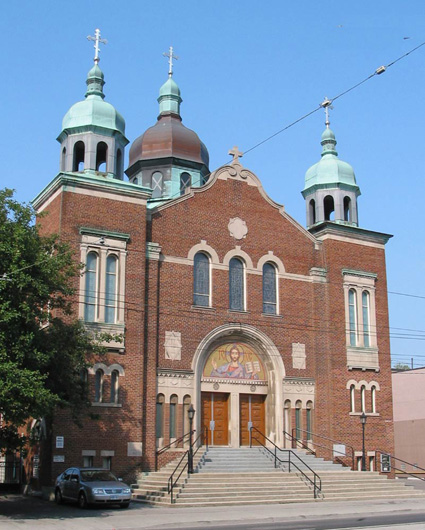
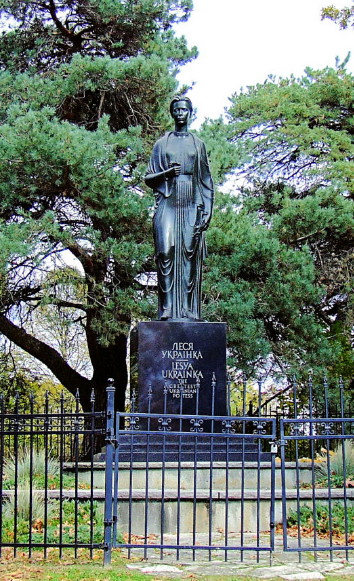
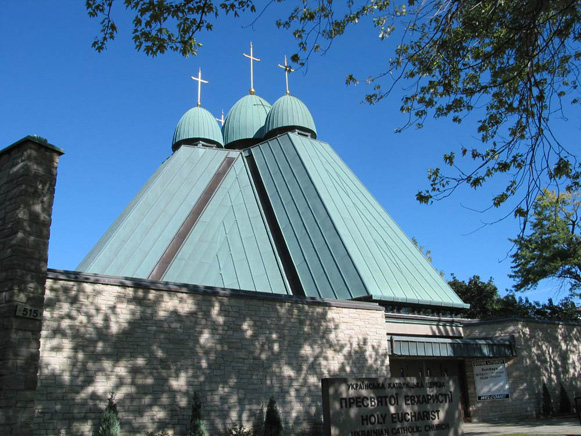
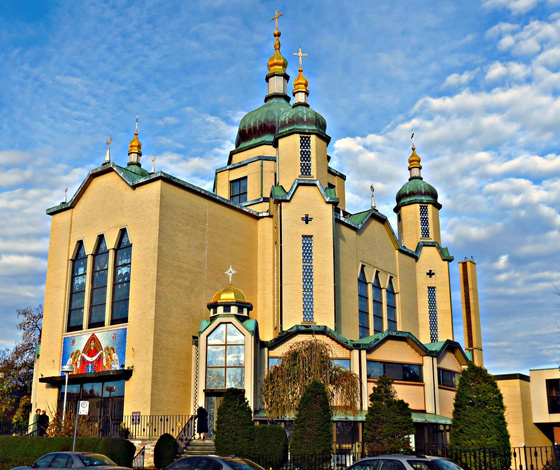
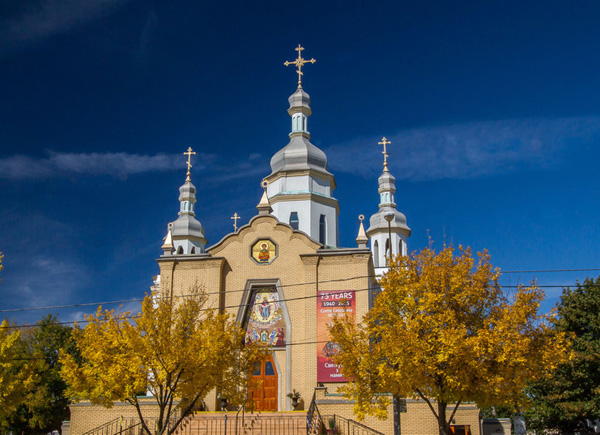
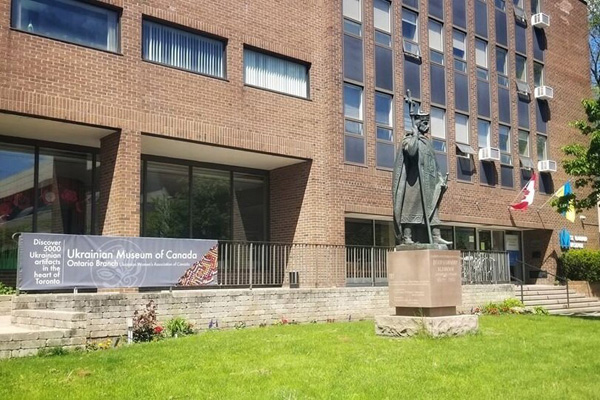
.jpg)
.jpg)
